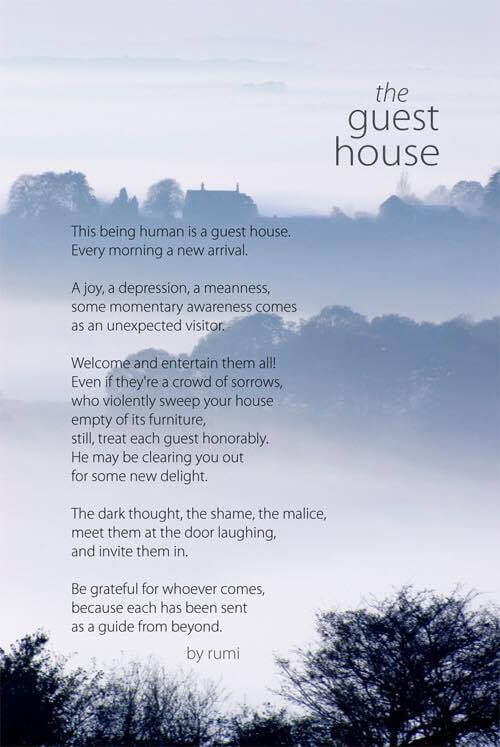
Up until about a month ago, once a week I posted “Writing I Love”, then chose to stop setting a regular schedule for it and simply to allow #Flow, with that last post being one I wrote the day Anthony Bourdain died.
More recently I wrote “Leadership – The impact of beautiful art” which was in part inspired by one beautiful line from David Foster Wallace:
“We’re all lonely for something we don’t know we’re lonely for.”
I love to read widely and be inspired by art and writing.
This week I read an article called “A Beginner’s Guide to Self-Awareness” and all of this lead me back to the favourite poem above by Rumi, The Guest House, which speaks to me about the bravery it takes to choose to be the truly open and vulnerable self it takes for self-awareness.
You see, while the article notes that “a high level of self-awareness was the strongest predictor of success.” for leaders, it also goes on to note how difficult it can be to truly see ourselves and to accept ourselves, to love ourselves at a level that allows true and deep self-awareness.
I often go back to Rumi. Why ? Let us go to source, and the most powerful line he ever wrote:
“I belong to no religion. My religion is love. Every heart is my temple.” ~ Rumi
Love is not a word used often in business, in leadership, and yet it is at the source of self-awareness.
In our world of business and leadership still dominated by outmoded models of control, hierarchy, scarcity, competition, we leave little room for leading from love. From abundance, empathy, understanding, empowerment, engagement, enablement.
To lead from that place requires a Sage and Visionary energy and also requires the strength to be vulnerable, to be humble, to, as Rumi puts it: “Be grateful for whatever comes”.
If I am being too non-specific, let me guide you back to the article, which featured powerful thoughts captured by Kristin Wong and from Dr Tasha Eurich . Around the bravery it takes to choose self-awareness, I give you the following passage, then I recommend, if you wish to look further, go to the article and see the specific recommendations given for following this through.
“Just because self-awareness is a desirable trait doesn’t mean it’s one we enjoy having. In a series of studies published last year in the Journal of Personality and Social Psychology, researchers asked subjects to engage in conversations with strangers, acquaintances, close friends, and loved ones, comparing the impression participants made on their conversation partner to the one they thought they made. Overall, the subjects enjoyed the interactions less when they had an accurate view of how they were perceived — when they had high levels of external self-awareness. “People tend to like individuals who have accurate self-perceptions, yet individuals tend to enjoy their own relationships more with people they believe see them in desirable ways,” the authors concluded. In other words, ignorance can be bliss when it comes to external self-awareness; like a heavily filtered Instagram, we’d rather people see a better version of ourselves, even if that version isn’t quite accurate.
Which is why self-acceptance is a necessary ingredient in self-awareness. “Self-acceptance is a really important tool to not just increase our self-awareness, but also love the person we think we are,” Eurich says. “You can think of them as two twin pillars.” Without self-acceptance, self-awareness becomes an unpleasant process, which in turn keeps us from embracing it. To put it another way, learning to accept yourself makes it easier to be honest about who you are.“
